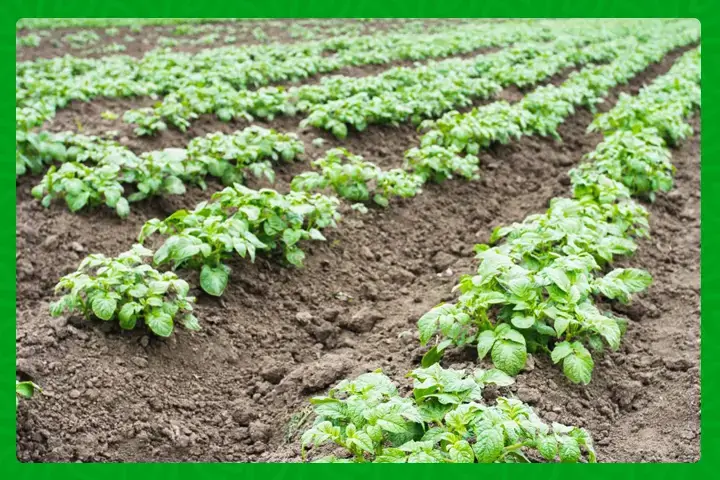
Sky rocketing potato prices seen at the end of 2023 could become the new reality if water usage restrictions are imposed on farmers in the Western Cape’s Sandveld region.
The Department of Water and Sanitation (DWS) has proposed a water reserve determination for the F60 and G30 catchments in the Berg-Olifants water management area in the Western Cape. Water reserves serve as a baseline of water availability in the region, which is then used to decide how much water can be extracted by all users. The DWS published the draft reserve determination in the government gazette in May. Based on the DWS’s figures on water availability, they propose that water extraction by farmers be reduced by 30% to ensure that the area has sufficient water to sustain its population and environment.
This would result in 30% of the hectares under potatoes in the Sandveld taken out of production, resulting in the quadrupling of potato prices.
“South Africa got a first-hand look late last year of what happens when potato production is drastically reduced. Due to loadshedding, farmers planted 1600 hectares of potatoes less last year, which resulted in a 173% increase in prices when market supply consequently dipped. This took the long-term average of R42,87 per 10kg bag to R72,92 per 10kg bag.
“Should the planned restrictions to reduce agricultural water usage by 30% be implemented, production would decrease by 2100 hectares, resulting in a catastrophic increase in prices,” said FP Coetzee, Potatoes SA’s manager of information and regional services.
Potatoes SA supports all efforts to preserve water resources and concurs with the Department on the importance of managing water in the designated catchments. The concern however is around imposing a water reserve beyond what is necessary to achieve ecological stability. “The consequences are far reaching. Potatoes will become unaffordable to those who depend on it for food security. This, and the consequences of decimating the local economy would result in job losses, social unrest, migration and economic disparity,” said Willie Jacobs, CEO of Potatoes SA.
Potatoes SA’s statistics show that around 57 farmers planting just under 6000 hectares and employing over 6000 people would be affected by the reserve determination. The Sandveld region is one of the few areas producing potatoes year-round, contributing significantly to a stable supply across the country throughout the year. Production in neighbouring provinces is approximately 700km away, making the Western Cape fresh produce markets largely dependent on locally produced potatoes from the Sandveld region.
Local government is also set to lose out as tax and VAT revenue could drop by around R300 million per annum.
Farming activity in the Sandveld has come under pressure since the 2015 drought, with unfounded allegations that water used for agriculture was the reason the Verlorenvlei, a Ramsar site, ran dry. Hydrogeologists within the DWS however showed that it was a natural consequence of the drought. Since the drought broke in 2022, the Verlorenvlei’s water levels have recovered.
At the crux of the concern over the reserve is that figures used to determine water levels are not grounded in scientific data. “By the DWS’s own admission, there are catchments where no water level monitoring is done. The Verlorenvlei’s meter itself has been broken since 2017. An assumption over water levels is dangerous because it puts everyone at risk – farmers, people and the environment,” said Jacobs.
Monique Vlok, chairperson of the Sandveld Potato Producers Association, said that the outcry over the Verlorenvlei running dry was borne out of a prevailing, incorrect perception that farmers mine the earth and its resources. “Farmers of course need water to grow crops and much water within the catchment is used to do so. But it puts food on the table and water is not used irresponsibly.
“Even so, we want to ensure that we, as well as future generations can keep farming and that means protecting natural resources. We are as much concerned about unsustainable water use as anyone else. We therefore focus on sustainable practices that maximises water use efficiency.”
Data from the Water Footprint Calculator shows that potatoes have the lowest water footprint of all staple crops – coming in at as little as 34 litres per serving of 113grams, compared to the 276 litres required to produce the same amount of rice, 144 litres for maize and 182 litres for a serving of bread. Potatoes therefore make a sustainable case for water allocation when considering best use of resources to ensure food security.
Jacobs reiterated that farmers shared concerns over sustainable water use. “No farmer wants to see the environment go to ruins. The Verlorenvlei is a precious part of the Sandveld that must be preserved, which is why we need to be far more scientific in our approach to managing water.
Only once proper monitoring is in place can we establish a baseline from which to work.
“But further to that we have to take seasonal water fluctuations into account so that we can use available water most efficiently, and for the greatest good. This will require more dedication from DWS to put systems in place to regularly monitor water levels, and implement seasonal water use allocations. With climate change bringing increased volatility in rainfall, this is the only way to go to ensure South Africa preserves our resources, while ensuring food security.”
Jacobs requested that DWS instead explore more efficient water management strategies, integrated water resource management, and the provision of training and capacity building for those involved in water management on potato farms as a solution. “These measures could achieve the desired ecological outcomes without the adverse effects on the potato industry and the broader community.”
–Ends—
Enquiries:
Dirk Uys, Manager Potatoes SA Research & Innovation
dirk@potatoes.co.za, 066 185 9549


















